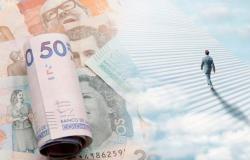06/09/2024
A project that cost US$12 billion, almost the same silver that arrived in Colombia through exports during the first quarter of this year, is the perfect example that Not all businesses turn out well for Arabs. Is about The World, a group of 300 islands off the coast of Dubai with the shape of the continents and the names of various countries. One of them even bears the name of Colombia.
“Surf the planet in Dubai (…) The World is an archipelago of artificial islands located on the coast that imitates the map of the world over 232 kilometers. The islands are named after countries, cities, regions and even famous people, such as Australia, Buenos Aires or Michael Schumacher Island,” reads the official site of this peculiar destination.
He The project began to be developed in 2003, but 20 years later it still has not come together. A recent article published by the BBC claims that it faces multiple problems. On the one hand, only 60% have been sold and the lack of infrastructure makes the islands look like white desert dots on the coast. Furthermore, time is running out and fears are growing that the waters of the Persian Gulf will reclaim the land that this construction took from them.
The bells are not for new people and they even started six years after The World came to life. In 2009, in the midst of the crisis due to the real estate bubble that burst and weighed down the world economy, Dubai was on the ropes with a debt of US$80 billion. One of the companies that caused him the most pain was Nakheel, the state real estate company in charge of the island project, which then had to lay off thousands of employees.
Nakheel managed to hang itself with obligations of the order of US$2.5 billion in the midst of the crisis and at the time several specialized portals described it as the firm “that almost bankrupted Dubai.” Much of its fall was explained because those who had committed to acquiring projects in The World were finally unable to comply, thus aggravating the tail of the real estate bubble.
The megaproject remains to be seen, although the positive side is that the real estate company solved its financial problems thanks to the fact that its holding company, Dubai World, was able to restructure debts, a process that ended in 2016.
An analysis by Newcastle University Geography professor Alastair Bonnett recalls how “in the last 20 years, many islands have been built to accommodate both tourists and wealthy residents, especially in the Arabian Gulf states and China.” .
The academic makes a particular, but realistic summary. “In an era of rising sea levels and increased storm activity, new islands can seem like a risky venture. However, the desire to have sea views and put the blue water between you and the noise, traffic and crime of the mainland keeps the market buoyant.”
Bonnett says that, by thoroughly researching this type of complex, he discovered how building an island is not as technically difficult as many may think. “In shallow waters, creating an island is not technically complex: Typically, the seabed over a wide area is vacuumed and ground, then sprayed and pounded into a stable base.”
“Visual scar”
Beyond the millions that they have cost and that after two decades they have not ended up being successful, these types of complexes have also generated controversy due to its environmental impact. A few years ago the Greenpeace organization described them as a “visual scar.”
He was referring exactly to Palm Jumeirah, an island in the shape of a palm tree with 17 leaves that was also in charge of the state-owned Nakheel. The initiative was ready in 2001, two years before The World.
According to TreeTake, “Greenpeace called the islands a ‘visual scar’, clouding the once clear Arabian Gulf with silt and burying coral reefs. In 2006, the World Wildlife Fund declared the UAE’s ecological footprint to be the ‘highest in the world.’”
The emirate of Dubai promotes this area as an “engineering marvel” that shows its efforts “to evolve and make dreams come true.” Palm Jumeirah offers an urban mix of island residences, glamorous 5-star resorts, trendy restaurants and sophisticated beach clubs.
Among other things, it has a 5-star resort called Atlantis, boardwalks, and Nakheel Mall and The Pointe shopping centers. It also has a luxury gastronomic diversity, as it is home to Gordon Ramsay’s Bread Street Kitchen, Massimo Botura’s Torno Subito and Yannick Alléno’s Stay.
Who are the tenants? An investigation published by Forbes Magazine revealed that in the exclusive area of Palm Jumeirah there are properties of celebrities, athletes and even Russian oligarchs. Among the names he mentions are those of the English businessman and former soccer player, David Beckham, or the founder of Telegram, Pavel Durov, who rents his house there for US$1 million.
The controversy, says the report from that medium, is that there Characters accused of corruption or who must be held accountable in their countries of origin are also safeguarded.
“Dubai also has other benefits: until recently, the UAE lacked extradition treaties with many countries. “That made it attractive to wealthy people who have had problems in their home countries,” the report reads.
The contrasts
Despite this controversial project of luxurious islands that has not taken off, the Arabs continue their advance on other fronts. It is no longer just oil, since its tentacles are slowly spreading to industries such as tourism.
According to the Dubai Department of Economy and Tourism, that area received 5.18 million tourists between January and March 2024, an increase of 11% compared to the 4.67 million visitors recorded during the same period in 2023.
“This Growth is also in line with the ambitious objectives of the Dubai Economic Agenda, D33, to further consolidate Dubai’s position as a leading global city for business and leisure,” said that entity.
In this regard, the Crown Prince of Dubai and Chairman of the Executive Council, Hamdan bin Mohammed, said that “the number of visitors in the first quarter of 2024 indicates that Dubai is on track to achieve another outstanding performance this year after the emirate received a record number of visitors last year, with 17.15 million tourists.”
Particularly in Dubai, there is also a strong push for the agri-food sector. and there are already up to 300 factories dedicated to this activity. The strong interest in renewable energies, technology, financial services and trade is also highlighted.
It is a crusade to take advantage of oil revenues and develop new sectors. Incidentally, for the United Arab Emirates, in general, the hydrocarbon industry is generating around US$105 billion a year, which is double what Colombia sells abroad. Japan, China and Thailand are its main clients.
for the signature KPMG, one of the great differentials of Dubai, and in general of the Arab Emirates, is that they are strategically located and facilitate trade with Europe, Africa and Asia. “Due to the continuous flow of new business opportunities, investor-friendly legislation, a sound financial system, a well-developed infrastructure for business and life, and the availability of human resources, the UAE can be an ideal location for business. for multiple purposes.
KPMG considers that this country has potential for foreign investors creating business and participation platforms for economic groups, opportunities to establish themselves there through nearshoring, or simply making agreements with local companies.






